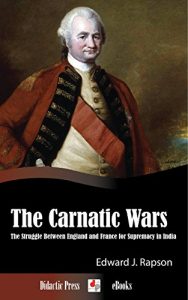In the year 1740, six years before the outbreak of war between the English and French in India, these two nations alone, out of the four chief European nations, who had embarked in Eastern enterprise, continued to hold any considerable power. The Portuguese — the first on the scene — had for a century maintained a complete monopoly of Eastern trade, and had raised up on the continent of India itself a power such as none of their European successors attained for a century and a half after their downfall. But their glory had long ago departed. The bigotry and intolerance and cruelty, which characterized the successors of d'Albuquerque, had long ago met with their just reward. The Dutch, who succeeded, in like manner failed to maintain the enormous power which they had once gained. They brought about their own ruin by a flagrant abuse of the monopoly, which they had wrested from the Portuguese. Next came the English, who, at this time, still continued to keep in their own hands the greater share of the traffic between Europe and India; and, some sixty years after the English, came the French whose commercial success, while not equaling that of the English, was still such as to make them formidable rivals.
Up to this time, English and French had existed side by side in India, without coming into serious collision, for more than seventy years, although England and France had been at war with each other for a considerable portion of that period. The settlers of the two nations had hitherto pursued entirely independent courses. The policy adopted by either side, towards the rules and inhabitants of the country, in which the settlements stood, was neither imitated from nor influenced by that pursued by the other, and the result of this was an important difference between the nature of English and French power and policy in India, which very greatly influenced the character of the subsequent struggle. In fact, this distinction, which was doubtless to a great extent the outcome of circumstances acting on the different national temperaments, made the contest an unequal one at the very outset, by placing the combatants on entirely different levels; and, had it not been for the preponderating influence of external causes — causes beyond the control of the settlers, whether English or French — the result of the contest would, in all probability, not have been what it was. It will be necessary, therefore, to gain a general idea, first, of the political state of India at this period, and, secondly, of the history of English and French in India up to this date...
Up to this time, English and French had existed side by side in India, without coming into serious collision, for more than seventy years, although England and France had been at war with each other for a considerable portion of that period. The settlers of the two nations had hitherto pursued entirely independent courses. The policy adopted by either side, towards the rules and inhabitants of the country, in which the settlements stood, was neither imitated from nor influenced by that pursued by the other, and the result of this was an important difference between the nature of English and French power and policy in India, which very greatly influenced the character of the subsequent struggle. In fact, this distinction, which was doubtless to a great extent the outcome of circumstances acting on the different national temperaments, made the contest an unequal one at the very outset, by placing the combatants on entirely different levels; and, had it not been for the preponderating influence of external causes — causes beyond the control of the settlers, whether English or French — the result of the contest would, in all probability, not have been what it was. It will be necessary, therefore, to gain a general idea, first, of the political state of India at this period, and, secondly, of the history of English and French in India up to this date...






